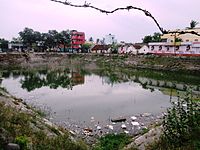Poigai Alvar Tamil pronunciationⓘ was one of the twelve Alvar saints of South India, who are known for their affiliation to Vaishnava tradition of Hinduism. The verses of Alvars are compiled as Nalayira Divya Prabandham and the 108 temples revered are classified as Divya Desam. Poigai is one of the three principal Alvars, with the other two being Bhoothath Alvar and Peyalvar, collectively called Mutalamalvargal, who are regarded to be born out of divinity. Poigai composed hundred verses that are classified as Mutal Tiruvantati, and his composition is set in the antati style, in which the ending syllable is the starting one for the next verse.

According to traditional account, the first three Alvars belong to Dvapara Yuga (before 4200 BCE). As per Hindu legend, Poigai was found in a small pond near the Yadhotakaari temple at Tiruvekkaa. In Tamil, small pond is called poigai, and since he was found in a pond, he got the name Poigai.
As per legend, the three Alvars were once confined in a small dark enclosure during a rain in Thirukovilur and they experienced a fourth individual among them. They found out that it was god Vishnu and Poigai Alvar wished to see his face continuously but could view only from the simmering light of the lightning. With a view to maintain the continuity of light, he instantly composed hundred songs wishing light to emerge. The other two continued composing hundred songs each on Vishnu. The works of these earliest saints contributed to the philosophical and theological ideas of Vaishnavism. Along with the three Shaiva Nayanmars, they influenced the ruling Pallava kings of the South Indian region, resulting in changing the religious geography from Buddhism and Jainism to the two sects[clarification needed] of Hinduism.
Alvars
The word Alvar means the 'immersed', referring to the poet-saints's deep devotion to their supreme deity, Vishnu. The Alvars are considered the twelve supreme devotees of Vishnu in Sri Vaishnavism, who were instrumental in popularising Vaishnavism during the 5th to 8th centuries CE. The religious works of these saints in Tamil, songs of love and devotion, are compiled as Naalayira Divya Prabandham, containing 4000 verses, with each of the 108 temples revered in their songs is classified as a Divya Desam. The saints had different origins, and belonged to different classes. According to tradition, the first three Alvars, Poigai, Bhoothath, and Pei, were born miraculously. Thirumalisai was the son of a sage, Thondaradi, Mathurakavi, Periya, and Andal were from Brahmin varna, Kulasekhara from the Kshatriya varna, Namm from a cultivator family, Tirupana from the Tamil Panar community, and Tirumangai from the Kalvar community.
Divya Suri Saritra by Garuda-Vahana Pandita (11th century CE), Guruparamparaprabavam by Pinbaragiya Perumal Jiyar, Periya tiru mudi adaivu by Anbillai Kandadiappan, Yatindra Pranava Prabavam by Pillai Lokacharya, commentaries on Divya Prabandam, Guru Parampara (lineage of Gurus) texts, temple records and inscriptions give a detailed account of the Alvars and their works. According to these texts, the saints were considered incarnations of some form of Vishnu. Poigai is considered an incarnation of Panchajanya (Krishna's conch), Bhoothath of Kaumodaki (Vishnu's mace), Pey of Nandaka (Vishnu's sword), Thirumalisai of Sudarshanam (Vishnu's discus), Namm of Vishvaksena (Vishnu's commander), Madhurakavi of Vainatheya (Vishnu's eagle, Garuda), Kulasekhara of Kaustubha (Vishnu's necklace), Periya of Garuda (Vishnu's eagle), Andal of Bhudevi (Vishnu's wife, Lakshmi, in her aspect as Bhudevi), Thondaradippodi of Vaijayanti/Vanamalai (Vishnu's garland), Thiruppaan of Srivatsa (An auspicious mark on Vishnu's chest) and Thirumangai of Sharanga (Rama's bow). The songs of Prabandam are regularly sung in several the Vishnu temples of South India daily and also during festivals.
According to traditional account by Manavala Mamunigal, the first three Alvars, namely, Poigai, Bhoothath and Pey belong to Dvapara Yuga (before 4200 BCE). It is widely accepted by tradition and historians that the trio are the earliest among the twelve Alvars. Along with the three Saiva nayanmars, they influenced the ruling Pallava kings, creating a Bhakti movement that resulted in changing the religious geography from Buddhism and Jainism to these two sects of Hinduism in the region. The Alvars were also instrumental in promoting the Bhagavata cult and the two epics of India, namely, Ramayana and Mahabharata. The Alvars were instrumental in spreading Vaishnavism throughout the region. The verses of the various Alvars were compiled by Nathamuni (824-924 CE), a 10th-century Vaishnava theologian, who called it the "Tamil Veda".
Early life

Temple tank in Yathothkari Perumal Temple where Poigai Alvar originated
Poigai was found in a small pond near the Yadhotakaari temple at Tiruvekkaa.In Tamil, a small pond is called a poigai, and since he was found in a pond, he got the name Poigai. At Kanchipuram there is a temple inside the Deva-sarovara lake. This temple enshrines an idol of Saroyogi in a recumbent posture with eyes closed in meditation. From childhood, Poigai was deeply devoted to Vishnu. He mastered all the Vaishnava speeches, and followed the Vaishnava tradition. He was variously known as Ayonigi, Saro-yogi, Kasara-yogi, Poigai-piraan, Saravora Munindra and Padma-muni.
Tamil
கைதை சேர் பூம்பொழில் சூழ் கச்சி நகர் வந்துதித்த
பொய்கைப் பிரான் கவிஞர் போரேறு - வையத்து
அடியவர்கள் வாழ அருந்தமிழ் நூற்றந்ததி
படிவிளங்கச் செய்தான் பரிந்து
Transliteration
kaidhai ser pumpoḻil suḻ kachi nagar vandhudhiththa
poygaip piran kavinjar poreru vaiyaththu
adiyavargal vaḻa arunthamiḻ nutrantati
padivilangkach seythan parindhu
Kanchi derives its name from Brahma, who is known as Ka; who worshipped God in this kshetram. In that famed city, in a lotus flower within a lotus pond, under the star Thiruvonam (Sravanam) which is the star of God Himself, Poigai was born. He gave the wonderful Mutal Tiruvantati pasuram, which is like a lamp that drives away the darkness of the mind and elevates the soul.